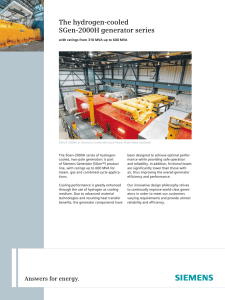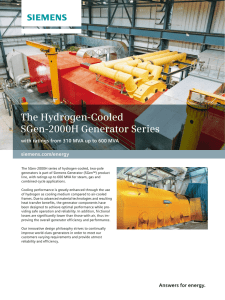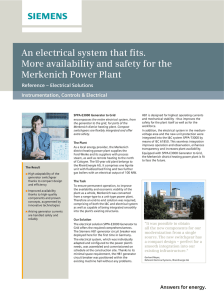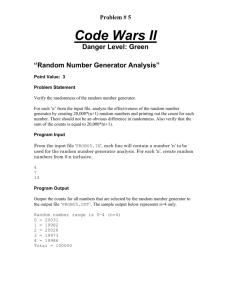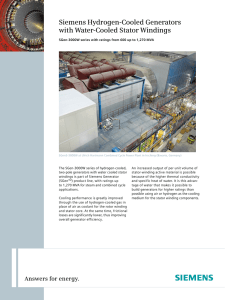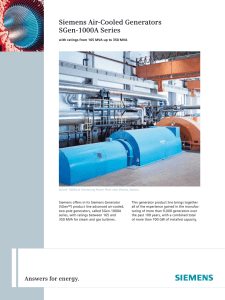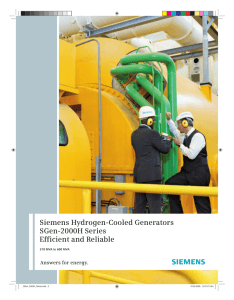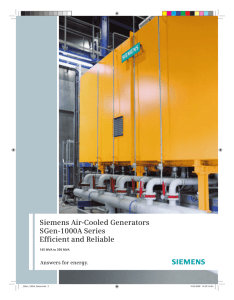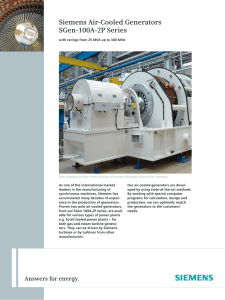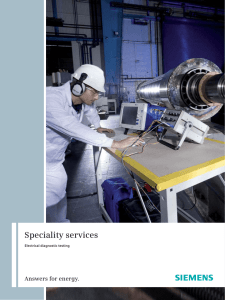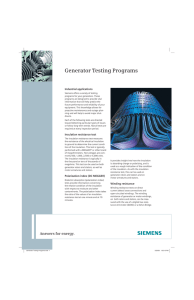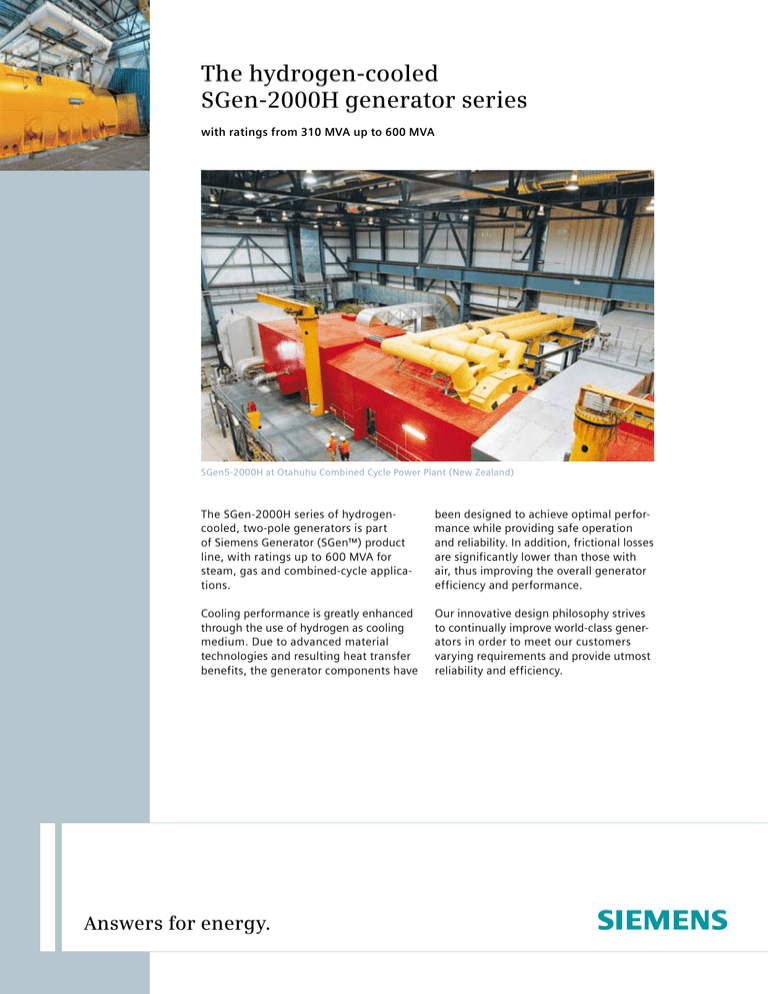
The hydrogen-cooled
SGen-2000H generator series
with ratings from 310 MVA up to 600 MVA
SGen5-2000H at Otahuhu Combined Cycle Power Plant (New Zealand)
The SGen-2000H series of hydrogencooled, two-pole generators is part
of Siemens Generator (SGen™) product
line, with ratings up to 600 MVA for
steam, gas and combined-cycle applications.
been designed to achieve optimal performance while providing safe operation
and reliability. In addition, frictional losses
are significantly lower than those with
air, thus improving the overall generator
efficiency and performance.
Cooling performance is greatly enhanced
through the use of hydrogen as cooling
medium. Due to advanced material
technologies and resulting heat transfer
benefits, the generator components have
Our innovative design philosophy strives
to continually improve world-class generators in order to meet our customers
varying requirements and provide utmost
reliability and efficiency.
Answers for energy.
Innovative design for world-class performance
in power generation: The SGen-2000H generator series
1 Thin laminations of high-grade, low-loss silicon steel are consolidated
to form the stator core. Each lamination is electrically insulated with
high-temperature capability material. The laminations are stacked to
form the stator core with finger-plates and heavy end-plates at each
end. Key bars and insulated through-bolts are used to maintain core
integrity and tightness. The resultant stator core assembly features long
lasting tightness, mechanical robustness, and excellent heat transfer
characteristics.
2 The generator stator winding assembly is manufactured with Vacuum
Pressure Impregnation (VPI) technology or Global Vacuum Pressure
Impregnation (GVPI). (G)VPI features advanced epoxy-mica insulation
systems to ensure insulation integrity, to reduce the possibility of loose
end-winding components and to reduce moisture and surface contamination, resulting in stator winding with high voltage endurance.
3 A patented core spring mounting system is used to reduce the noise
level and transient forces. The design isolates the double operating
frequency core vibration and reduces electrical transient forces on the
generator frame and foundation.
4 The patented RIGI-FLEXTM end-winding support system has been in
successful operation since the 1980s. This well proven bracing system
provides rigidity to withstand transient fault loads combined with
flexibility to withstand normal operation cyclic thermal expansion
and contraction which occurs during start-ups and load changes.
5 An optimized rotor slot design provides uniform cooling flow through
the rotor while also improving overall dynamic stability. A single-stage
blower at each end of the generator results in a uniform thermal load
in the generator rotor.
2
1
5
4
3
Customer Benefits
2
■■
Efficiency of up to 99 %
■■
Hydrogen seal with carbon elements
requires minimal seal oil and has
improved emergency operating
characteristics
■■
Uniform temperature profile
promotes reliability
■■
Simplified installation
■■
Transport dimensions suitable
for rail transport in most countries
■■
Design based on field-proven
generator component designs
For over 60 years, Siemens has made
many detailed improvements to the
design of hydrogen-cooled generators.
Additional improvements include:
■■
Advanced Performance Plus™ seal
system
■■
Totally enclosed system minimizes
the risk of contamination inside the
generator
■■
Integrated & Compact Omega™
Coolers
3
1 Bearing Oil Catcher
7 Patented Core Spring
Mounted System
12 Bearing
2 Carbon Seal
3 Carbon Seal Bracket
8 Winding Brace
14 Excitation End
4 Stator Windings
9 Blower Shroud
15 Outer (Oil) Seal
5 Rotating Blades
10 Omega Cooler
6 Finger Plates
11 Blower Hub
13 Rotor Shaft
4
6
3
15
1
5
2
13
7
14
12
8
11
9
10
Technical Data
Model
Frequency
Power Factor
Apparent Power
Efficiency
Terminal Voltage
SGen5-2000H
50 Hz
0.85
350 MVA to
~600 MVA
up to 99 %
16.5 kV to 22 kV
SGen6-2000H
60 Hz
0.85
310 MVA to
~600 MVA
up to 99 %
19 kV to 23 kV
Coolant
Hydrogen at 4 to 5 bar
Design
In accordance with IEC and ANSI standards and EU Directives
Thermal Classification
Class F insulation system
Type of enclosure
IP64 (IEC34-5); suitable for outdoor installation
Excitation
Static
Transport dimensions
Suitable for rail transport in most countries
3
The hydrogen-cooled SGen-2000H generator series:
References
Our hydrogen-cooled two-pole generator series exceeds an availability of 99.5% and
counts with more than 100,000 operating hours which have earned Siemens a flawless
reputation in the filed of reliable power generation steam and gas turbine applications.
Therefore, the following references are only a few examples to illustrate the vast potentials
of the SGen-2000H generator series.
Hamm-Uentrop, Germany
Combined Cycle
Power Plant
New Taweelah B, Dubai
Combined Cycle
Power Plant
Baosteel, Shanghai
Steam Power Plant
Net plant output:
840 MW
1170 MW
350 MW
Commercial operation:
2007
2008
2009
Generator:
2x SGen5-2000H
1x SGen5-2000H
3x SGen5-1000A
1x SGen5-2000H
Steam turbine:
2x SST5-3000
Special solution
1 x SST5-5000
Gas turbine:
2x SGT5-4000F
3x SGT5-4000F
Performance
Major components
For more information please contact
your local Siemens sales representative.
Published by and copyright © 2010:
Siemens AG
Energy Sector
Freyeslebenstrasse 1
91058 Erlangen, Germany
Siemens Energy, Inc.
4400 Alafaya Trail
Orlando, FL 32826-2399, USA
www.siemens.com/energy
For more information, please contact
our Customer Support Center.
Phone:+49 180/524 70 00
Fax: +49 180/524 24 71
(Charges depending on provider)
E-mail:support.energy@siemens.com
Fossil Power Generation Division
Order No. E50001-W210-A148-X-4A00
Printed in Germany
Dispo 34802, c4bs No. 7449
TH 214-100269 431160 DB 08102.0
Printed on elementary chlorine-free
bleached paper.
All rights reserved.
Trademarks mentioned in this document
are the property of Siemens AG, its affiliates,
or their respective owners.
Subject to change without prior notice.
The information in this document contains
general descriptions of the technical options
available, which may not apply in all cases.
The required technical options should therefore
be specified in the contract.

